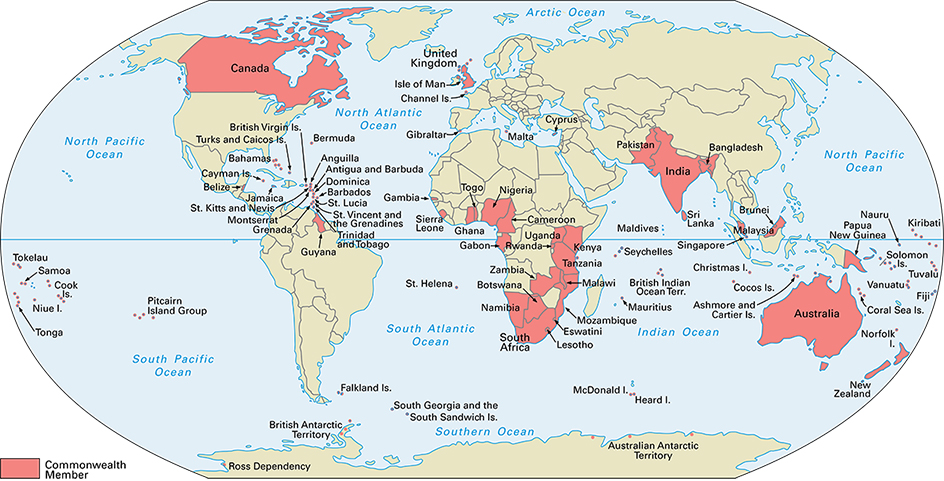Commonwealth of Nations is an association of independent countries and other political units, most of which formerly lived under British law and government. The Commonwealth includes the United Kingdom; more than 55 independent nations, nearly all of which were once British colonies; and about 25 other political units, such as territories and dependencies.

The United Kingdom is involved in some way in the government of most of the units in the Commonwealth. In other units, Australia or New Zealand has some involvement in the government. Members cover about a fourth of Earth’s land surface and have about a third of the world’s population.
The Commonwealth countries have a tradition of mutual cooperation. The Commonwealth heads of government assemble from time to time to exchange views on important international issues. At these meetings, the leaders seek to identify common goals in economic and foreign affairs. They work to coordinate their national policies to pursue these goals. But the nations are not required to obey conclusions reached at the conferences.
The Commonwealth of Nations conducts various programs through Commonwealth agencies. For example, several jointly financed programs provide economic aid and technical assistance to less developed nations in the group. The Commonwealth also supports agencies that promote cooperation in such activities as broadcasting, cable and satellite communication, education, health care, and scientific research. The Commonwealth Secretariat leads and coordinates Commonwealth activities. The secretariat has its headquarters in London.
Independent members
of the Commonwealth of Nations mostly consist of former British colonial areas, dependencies, or dominions that have become self-governing but have retained their Commonwealth ties. Despite the Commonwealth’s tradition of cooperation, each nation maintains its own foreign policy, which reflects its own interests.
All the independent members recognize the British monarch as head of the Commonwealth. But the monarch is mainly a symbol and has no real power. The United Kingdom and about 15 other Commonwealth nations are monarchies that regard the British ruler as head of state. A few others have their own monarchs. Over half the Commonwealth nations are republics.
Dependencies
are Commonwealth areas that do not have complete self-government. They are administered by independent Commonwealth members. Most dependencies are developing toward self-government.
Most of the dependencies are areas that have been annexed to the British Crown. This means that persons living in them are British citizens. These dependencies were formerly called colonies or crown colonies. They are now referred to as the United Kingdom Overseas Territories. A governor or commissioner appointed by the British government is the highest official in each territory. This official holds all political power in some territories. In other territories, the official shares power with an elected assembly. Some of the overseas territories have become practically self-governing. Most of these areas are ruled as though they were parts of the United Kingdom.
The term dependency may also be used to refer to other kinds of political units. These units include crown dependencies, joint administrations, self-governing areas, and other territories.
Crown dependencies
are self-governing territories annexed by the British Crown. They are not bound by acts of the British Parliament unless the crown dependencies are named.
Joint administrations
are controlled by two nations that have interests there. Each of the nations is responsible for its own property and personnel in the area.
Self-governing areas
control their own internal affairs. They have agreed to let a Commonwealth nation handle their defense and foreign relations. But these areas can declare full independence at any time.
Other territories
are dependencies of Australia or New Zealand. Each territory has an administrator chosen by the government of Australia or New Zealand. In some territories, this official holds all political power. In other territories, the administrator shares power with an elected assembly. Some territories have become nearly self-governing. Australia and New Zealand control defense and foreign policy for their territories.
History.
The Commonwealth of Nations began to take form in the early 1900’s. At that time, representatives of certain British colonies met with British representatives at Imperial Conferences. All these colonies had self-government in domestic affairs. But the United Kingdom managed their foreign policy and defense.
During the 1910’s and 1920’s, the self-governing colonies moved toward independence in foreign affairs. Representatives at a 1926 Imperial Conference declared all participating countries to be completely self-governing nations. They described these nations as equal in rank, “united by a common allegiance to the Crown and freely associated as members of the British Commonwealth of Nations.” The Statute of Westminster, a British law of 1931, legalized the 1926 declaration. The original members were Australia, the United Kingdom, Canada, Ireland, New Zealand, Newfoundland, and South Africa.
In 1932, the Commonwealth nations established a system of trade called Commonwealth Preference. Under this system, the United Kingdom imported goods from other Commonwealth countries without imposing the usual tariffs. Other Commonwealth nations negotiated favorable trade agreements with each other.
Between 1947 and 1980, about 40 more British colonies became independent nations. Nearly all joined the Commonwealth. During this time, Newfoundland became a province of Canada, and Ireland and South Africa gave up Commonwealth membership because of disagreements with other members. By the mid-1960’s, nearly half the members were African nations. South Africa rejoined the Commonwealth in 1994. When the African nation of Mozambique was admitted into the Commonwealth in 1995, it was the first member that had no colonial or constitutional link to the United Kingdom. Since then, three other African countries without such a link have become members—Rwanda in 2009, and Gabon and Togo in 2022.
In 1977, the United Kingdom completed a plan to discontinue its special trade agreements with Commonwealth nations. It had begun this plan in 1973, when it joined the European Community (EC), an economic association of European nations. In 1993, the EC members formed the European Union (EU) to increase economic and political cooperation among themselves, and the EC was incorporated into the EU. After the United Kingdom left the EU in 2020, it again pursued trade pacts with Commonwealth members.
